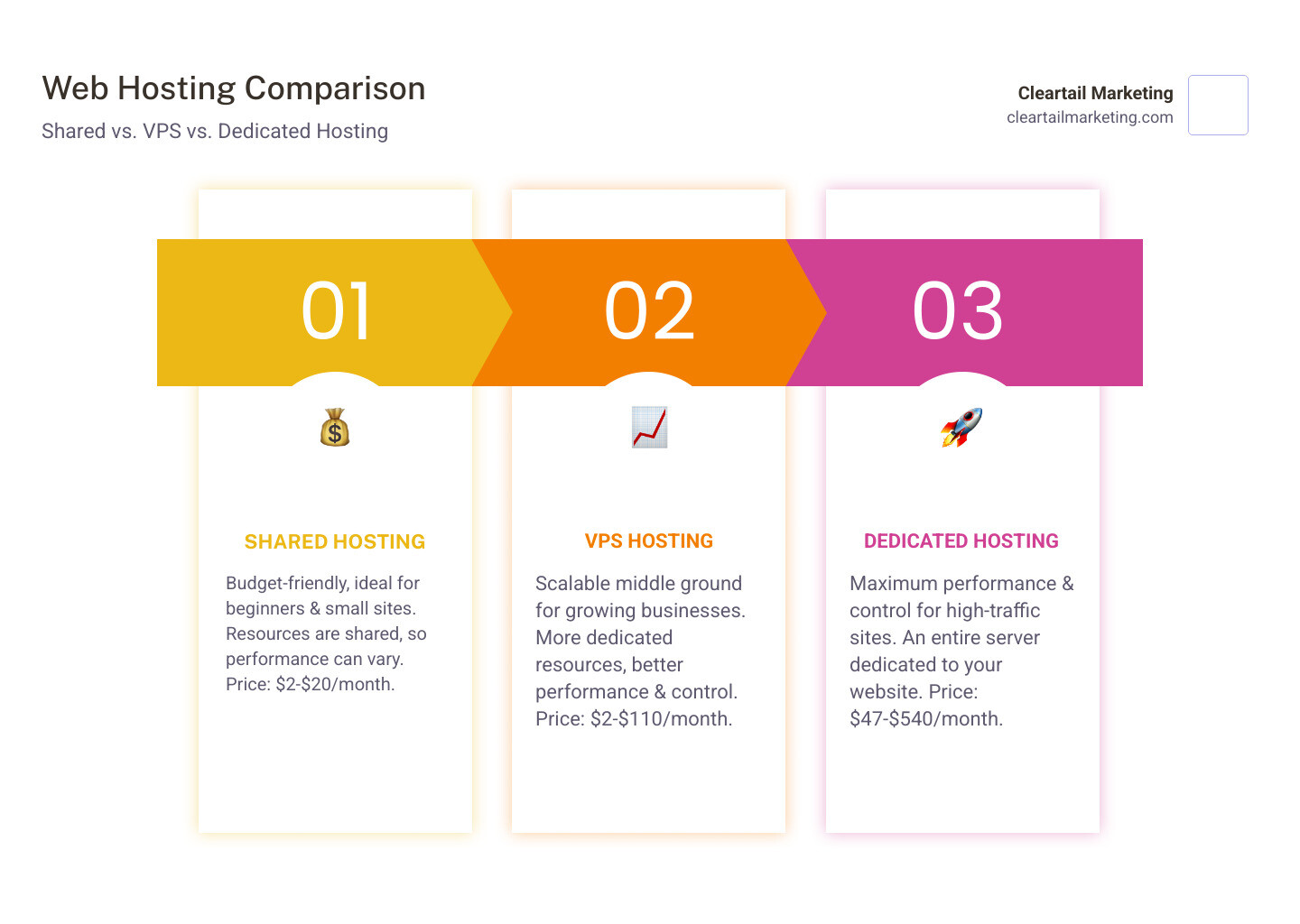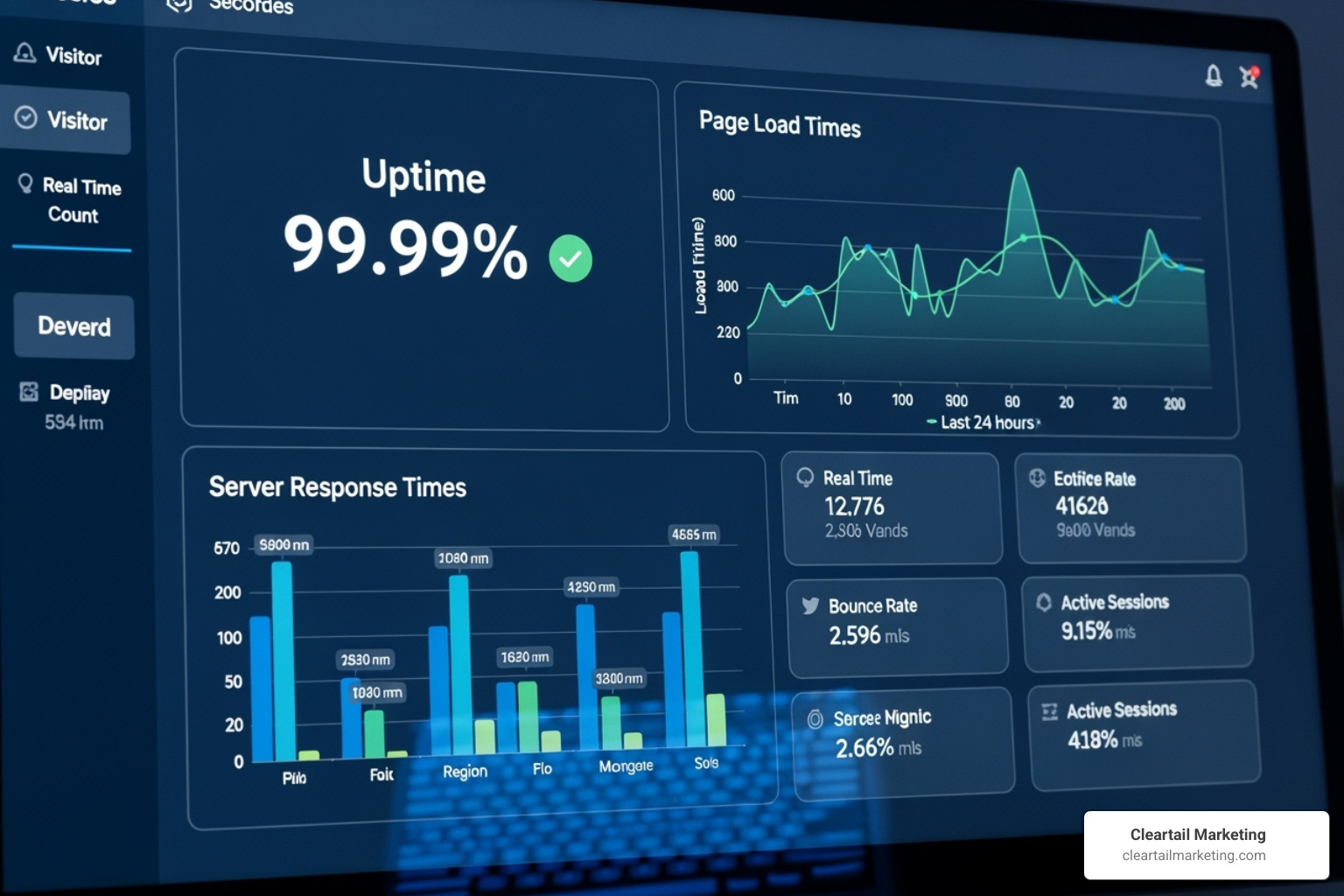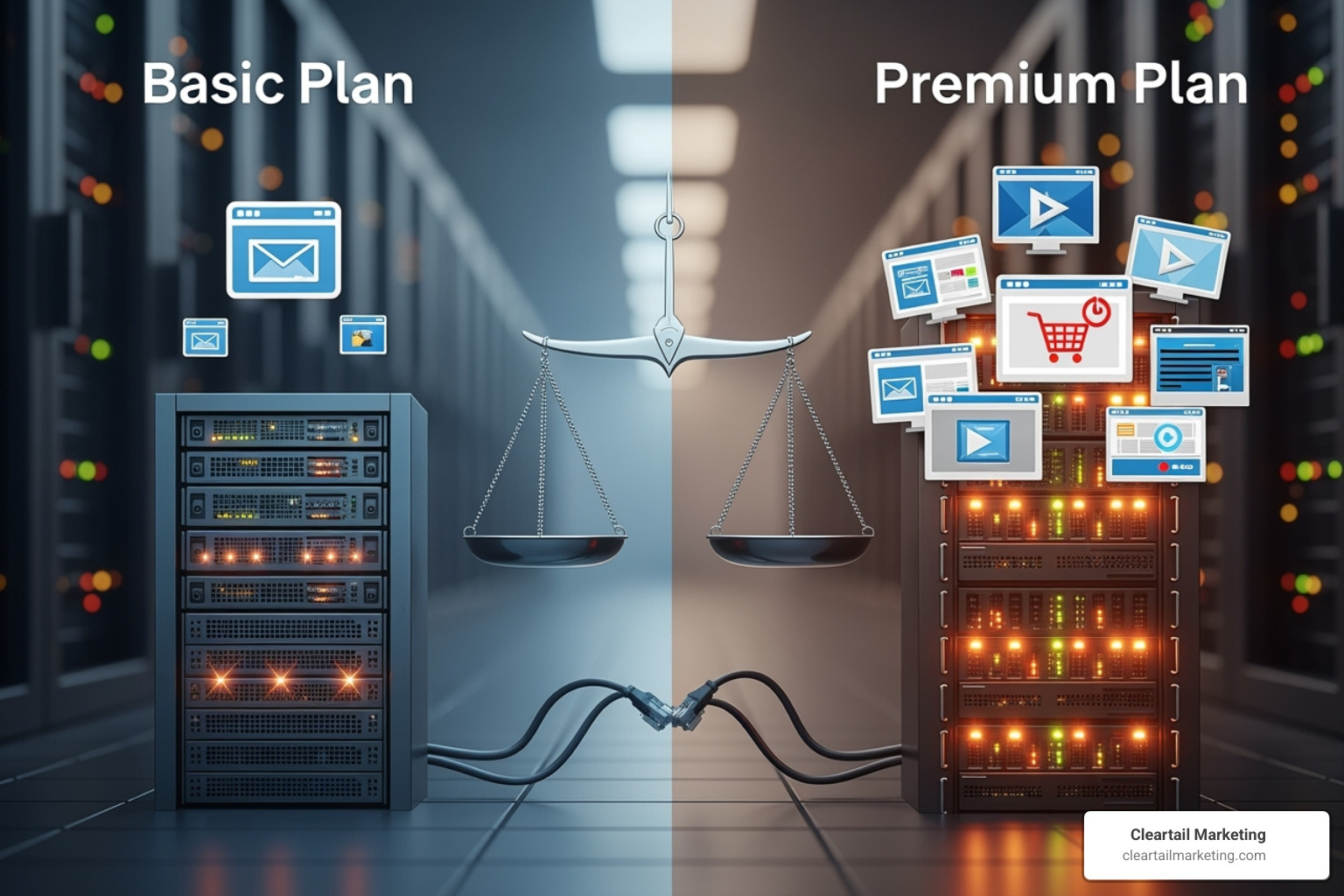Why Choosing the Right Web Hosting Plan Matters
When you compare hosting plans, you’re making a critical decision for your website’s success. The wrong choice leads to slow speeds, downtime, and lost visitors.
Quick Comparison Guide for Web Hosting Plans:
- Shared Hosting: $2-$20/month – Best for beginners and small websites
- VPS Hosting: $2-$110/month – Perfect for growing businesses needing more control
- Dedicated Hosting: $47-$540/month – Ideal for high-traffic sites requiring maximum performance
- Cloud Hosting: Variable pricing – Great for scalable, reliable hosting solutions
Key Factors to Compare:
- Uptime guarantee (99.9% is standard)
- Loading speed (critical for user experience)
- Storage and bandwidth
- Security features (SSL, backups, etc.)
- Customer support
- Renewal pricing (often much higher)
Price alone shouldn’t be the deciding factor. A cheap, unreliable host will cost more in lost business than you save. Your hosting choice impacts SEO and user experience, as Google favors fast sites and visitors leave slow ones.
I’m Magee Clegg, founder of Cleartail Marketing. Since 2014, we’ve helped over 90 B2B companies grow. We help clients align their hosting choice with their business goals, ensuring their digital foundation supports, not hinders, their success.

Understanding the Foundation: Types of Web Hosting
Choosing the right web hosting is like picking a home for your website. A basic plan won’t work for a high-traffic e-commerce site, just as a studio apartment won’t suit a large family. Each hosting type offers different resources, control, and costs. A slow site is a conversion killer: research shows that bounce rate increases by 32% when loading time goes from one to three seconds.
Shared Hosting: The Budget-Friendly Starter
Shared hosting is the most common and affordable option, like living in an apartment building where you share resources (CPU, RAM, disk space) with other websites. This makes it affordable, typically costing $2 to $20 a month.
Pros:
- Low Cost: Ideal for beginners, personal blogs, or small businesses.
- Beginner-Friendly: Comes with user-friendly control panels and one-click installers.
- Maintenance-Free: The provider handles all server maintenance and security.
Cons:
- Resource Sharing: Performance can be affected by other sites on the server.
- Slower Speeds: Shared resources can lead to slower loading times.
- Limited Control: Less control over server configurations.
VPS Hosting: The Scalable Middle Ground
VPS (Virtual Private Server) hosting is a step up from shared. It’s like owning a condo in the building; you share a physical server, but it’s partitioned into virtual machines with dedicated resources (CPU, RAM). Plans typically cost between $2 and $110 a month.
Pros:
- More Resources: Guaranteed resources lead to more consistent performance.
- Better Performance: Less susceptible to “noisy neighbor” issues.
- Increased Control: Often includes root access for custom software and configurations.
- Scalability: Easy to scale resources as your website grows.
Cons:
- Moderate Cost: More expensive than shared hosting.
- Technical Knowledge Required: Managing a VPS often requires some technical skill.
- Configuration Complexity: Can be more complex to set up than shared hosting.
Dedicated Hosting: The Powerhouse Performer
Dedicated hosting is the top-tier solution for high-traffic sites needing maximum performance and control. It’s like owning the entire building—a physical server dedicated solely to your website, giving you exclusive access to all its resources. Plans cost between $47 and $540 a month.
Pros:
- Maximum Performance: All server resources are dedicated to your site for top speeds.
- Full Server Control: Complete root access for total control over the server environment.
- High Security: Eliminates security risks from shared environments.
- Customization: Tailor the server environment to your exact needs.
Cons:
- Expensive: The most costly hosting option.
- Technical Expertise Required: Demands significant technical skills for server management.
- Underutilization: Can be overkill for smaller websites.
Cloud Hosting: The Flexible & Reliable Choice
Cloud hosting is a modern, flexible solution. Your site is hosted on a network of interconnected virtual servers (the “cloud”), not a single server. This allows resources to be pulled from multiple servers, ensuring high availability and scalability.
Pros:
- Scalability: Easily scale resources up or down on demand.
- High Uptime: If one server fails, your site automatically switches to another.
- Pay-for-Use Models: Often you only pay for the resources you consume.
- Redundancy: Data is replicated across multiple servers for protection.
Cons:
- Variable Cost: Unpredictable usage can lead to unexpected bills.
- Complexity: Can be more complex to manage than traditional hosting.
- Security Concerns (Perception): Some users perceive cloud environments as less secure, though providers use advanced security.
How to Compare Hosting Plans: Key Factors to Consider
When you compare hosting plans, don’t just look at the price. That’s like buying a car without checking if it runs. The real value is in reliability. Your hosting provider is your website’s foundationit needs to be solid, secure, and affordable long-term.

Performance: Uptime and Site Speed
Performance is critical. A slow or unavailable site means lost visitors and sales. Aim for an uptime of at least 99.9% (the industry standard). While some providers offer higher guarantees, others don’t offer one at all, so be wary of vague promises.
Site speed is just as vital. Look for modern tech like NVMe storage (faster than SSDs), a Content Delivery Network (CDN) to serve content from global locations, and caching to speed up load times for return visitors. Many WordPress hosts include built-in caching tools.
Security: Protecting Your Digital Assets
Security is essential for protecting your site and visitor data. SSL certificates are a must; they encrypt data, and Google recommends HTTPS and uses it as a ranking signal. Most reputable hosts provide them for free.
Also look for DDoS protection to prevent traffic floods, Web Application Firewalls (WAFs) to filter malicious traffic, regular malware scanning, and automated backups. Be aware that some host backups may not be sufficient for critical data, so a third-party service might be necessary.
Pricing: Beyond the Introductory Offer
Hosting prices can be misleading. Be wary of low introductory prices, as they often require long-term commitments and lead to sticker shock at renewal time. For example, a $3/month plan might jump to $18/month upon renewal. Always check the renewal rate to understand the true cost.
Look for a 30-day money-back guarantee to test the service risk-free and watch for hidden fees for add-ons during checkout.
Customer Support: Your 24/7 Lifeline
When your site has issues, you need reliable support. 24/7 availability is non-negotiable. Look for multiple support channels like live chat, phone, and email. Quality matters; some hosts rely on AI chatbots, which can be frustrating when you need a human. A comprehensive knowledge base is also valuable for solving problems yourself.
Features & Freebies
Extras can add significant value. A free domain name for the first year saves you money upfront. Free site migration is a huge time-saver if you’re switching hosts. Most plans also include professional email hosting for a polished address. Many providers now offer drag-and-drop website builders and AI-powered tools for site generation and content creation, which can save hours of work.
How Cleartail Marketing Helps You Compare Hosting Plans
At Cleartail Marketing, we help you compare hosting plans by acting as your hosting matchmaker. Since 2014, we’ve seen how the right hosting accelerates success. We don’t offer one-size-fits-all solutions; instead, we learn your business goals, growth projections, and budget to recommend the perfect fit. We cut through the technical jargon to focus on what matters: reliable uptime, fast speeds, robust security, and dependable support.
| Feature | Cleartail Marketing’s Hosting Solutions |
|---|---|
| Starting Price | Custom pricing based on your needs |
| Best For | WordPress sites, e-commerce, business growth |
| Storage | Scalable SSD storage solutions |
| Uptime | 99.9% uptime guarantee with monitoring |
Best for WordPress & Beginners
For those new to WordPress or who want hosting that ‘just works,’ our managed WordPress hosting is ideal. We handle the technical headaches with automatic updates, 24/7 security monitoring, and seamless free domain setup. Our user-friendly dashboard simplifies site management, letting you focus on growing your business while we handle the heavy lifting.
Best for E-commerce & Business Growth
For an online store, downtime is lost revenue. Our e-commerce hosting is built for speed and reliability, optimized for platforms like WooCommerce to ensure fast page loads and smooth checkouts. Scalability is built-in to handle traffic spikes, and we integrate AI-powered tools to help optimize your store and improve customer experience.
Best for Customer Support & Reliability
We excel in support and reliability. Unlike hosts that rely on chatbots, our award-winning support team offers personalized, 24/7 assistance via live chat, phone, or email. Our proprietary security measures and speed optimization tools go beyond the basics. We proactively monitor performance, acting as your dedicated IT team without the high cost.
Best Eco-Friendly Option
We take sustainability seriously. We partner with providers committed to green hosting initiatives and energy-efficient infrastructure. Our eco-friendly options deliver top performance while supporting your company’s commitment to sustainability.
Best for Tight Budgets
Not every business has a large hosting budget. We find solutions that fit your budget without sacrificing quality. We are transparent about renewal rates and offer flexible contracts. Our affordable introductory prices are part of our commitment to making great hosting accessible to all businesses.
Making Your Final Decision: A Checklist
Now it’s time to make your final choice. When you compare hosting plans, be honest about your current needs and future growth. A plan that works today might not in six months, so choose a provider that allows for easy scaling.

Also, consider your technical comfort level. If you’re not tech-savvy, managed or shared hosting with great support is best. If you love control, consider a VPS or dedicated server. Finally, look beyond the monthly fee to the true cost, including renewals and add-ons. Paying a bit more now can save you from lost revenue later.
How to compare hosting plans for your business
For a business, your website is your digital storefront, so downtime equals lost revenue. For e-commerce, prioritize speed and security with features like PCI compliance and SSL. Plan for traffic volume by choosing a host that can handle spikes, like a scalable cloud plan. Business security requirements are high; you need DDoS mitigation, malware scanning, and reliable backups. Finally, scalability planning is crucial—choose a host that lets you upgrade resources easily without downtime.
How to compare hosting plans for a personal project
Personal projects offer more flexibility, but don’t settle for poor service. For blog hosting, look for WordPress-optimized plans with features like automatic updates and caching for better performance. Portfolio sites with high-resolution media need generous storage and bandwidth to avoid overage fees. Ease of use is key if you’re not a tech expert; look for intuitive control panels and good support. For cost optimization, starting with a budget-friendly shared hosting plan and upgrading later is a smart strategy.
Frequently Asked Questions about Comparing Hosting Plans
When we sit down with clients to compare hosting plans, certain questions come up again and again. These are the same concerns you probably have right now, so let’s address them with straight answers that actually help.
What’s the difference between a domain name and web hosting?
Think of it this way: your domain name is your website’s street address (e.g., yourawesomewebsite.com), while web hosting is the actual house where your website’s files are stored. The domain points visitors to the right place, and the hosting makes your site’s content available online. You need both for a website to function. Many providers offer a free domain for the first year with a hosting plan.
Can I switch my hosting provider later?
Yes, you can switch hosting providers. This process is called site migration. Many reputable hosts, including Cleartail Marketing, offer free migration services to handle the technical transfer of your files, databases, and emails. Using a professional service is recommended to avoid downtime or data loss. Plan your move in advance for a smooth transition.
How much should I expect to pay for web hosting?
Hosting costs vary by type:
- Shared hosting: $2 to $20 per month. Best for new or small sites.
- VPS hosting: $2 to $110 per month. A good middle ground for growing businesses.
- Dedicated hosting: $47 to $540 per month. For high-traffic sites needing maximum power.
The biggest catch is renewal pricing. A low introductory rate can increase significantly after the initial term. When you compare hosting plans, always check the long-term renewal costs to understand the true price. Look for longer contracts to lock in rates and money-back guarantees to test the service.
Conclusion: Choosing the Right Partner for Your Website’s Success
Choosing a web host isn’t about finding the cheapest plan; it’s about finding a partner for your website’s growth. When you compare hosting plans, you’re choosing the foundation for your digital presence. As we’ve covered, the key is to match the hosting type to your current needs and future goals.
Performance, security, and support are not optional—they are critical to your success. A slow, insecure site with poor support will cost you money and damage your reputation.
At Cleartail Marketing, we’ve helped businesses make these decisions since 2014. We know that the right hosting foundation is essential. Your provider should be an extension of your team.
The fundamentals of good hosting—reliability, performance, security, and genuine support—are the building blocks of trust with your visitors.
Ready to stop comparing and start building? We’re here to help you move from confusion to confidence.




